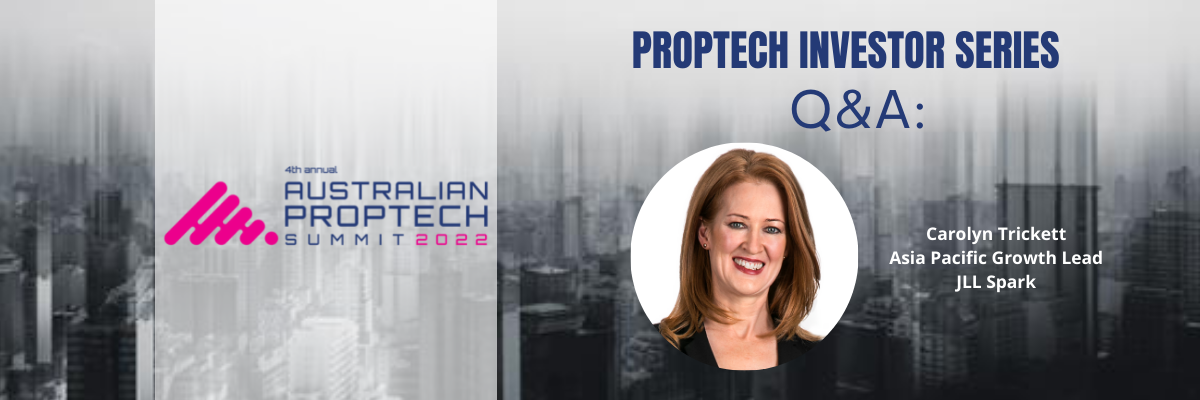In the lead up to the Australian Proptech Summit 2022, as part of the Proptech Investor Series, we interviewed Carolyn Trickett, who was appointed Asia Pacific Growth Lead, JLL Spark in March this year. Founded in 2017, JLL Spark’s team and venture capital fund have invested tens of millions of dollars in more than twenty early-stage PropTech start-ups. We wanted to know which specific innovations they are looking at and why?
1. Tell us a bit about yourself. Your background, current role and how did you get started in venture capital?
I started my career as a software developer, then moved into systems integration, consulting and project delivery. I then spent the past 12 years as Head of Business Technology for the Property and Asset Management business at JLL, implementing a range of applications across Asia Pacific. I saw a lot of potential in the proptech space and was very keen to get more involved, beyond what the JLL business was working with.
When the role came up at JLL Spark, our own venture capital fund, I jumped at the chance to leverage my tech background and my knowledge of JLL’s business. JLL Spark is a strategic investor, so we’re not just looking for financial returns; we specifically choose start-ups that we believe we can help to grow, either by using them within JLL, or introducing them to our clients. My understanding of the industry and the requirements of our business are valuable for both the investment decision-making process and the ongoing growth activities.
2. How different is it to build a proptech start-up today than 5 years ago?
In some ways it is easier because knowledge has increased across the industry about why tech is so important - there’s a lot more general awareness and media commentary. Many organisations run internal training to ensure their staff have appropriate skills in topics like design thinking, digital transformation and change management. The COVID pandemic has also accelerated take-up in some areas, as organisations consider a long-term change in the way people use their office space.
On the other hand, the landscape has become more difficult for some start-ups, because there's a lot of competition and they need to be very good at articulating how their product is differentiated, to get attention from potential clients and from potential investors.
3. A lot of innovation is coming from incubators and in-house labs, which have a lot of talent and resources. How can proptech start-ups compete?
The key advantage that I believe start-ups have over in-house labs, is a more lateral approach to product ideation. It’s too easy for established companies to design products to retrofit their existing process and this means they are often constrained by perceptions of the “right” way to do something, which is not always the best way to do it. Start-ups also have the advantage of agility – they can create new products, fail fast and start again without as much scrutiny, because they are working on their own time, on their own terms.
4. Proptech saw an explosion of investment in 2015-18 (estimated US$30 billion worldwide) and then a loss in momentum. What does the future hold for proptech investment?
Global Proptech funding did decrease in 2020, but is bouncing back this year. JLL recently released a report stating that 2021 could be a record-breaking year for proptech start-up funding. The industry is maturing, the hype has settled down, and we are also seeing a shift to later stage funding.
We're also now starting to see an increased pace of consolidation and acquisition, which is sign that fund raising is more difficult, so start-ups are looking at other options for capital and growth. The result of this is we will probably see less new companies in the proptech space.
I have also noticed a trend in development of products that are positioned as integration hubs or middleware for other platforms. These integrated technology solutions will link together different solutions to provide a seamless tenant experience, for example, or create a connection between facilities management, health and safety, and sustainability.
5. What are new areas for commercial proptech that you are excited about as a venture investor?
I’m excited to see more artificial intelligence and machine learning being used in new products. To me, this indicates that we are moving beyond digitising business processes, towards true automation. I can see a shift in the products being built – where they were solving basic problems a few years ago, the new ideas coming through now are more sophisticated, more imaginative and challenging the status quo.
6. Any book you would recommend to aspiring proptech entrepreneurs?
I started reading “Proptech 101” a few months ago, written by the founders of Metaprop. It’s a couple of years old now, but gives some good insights into the landscape and history in the space, as well as some future predictions.
I recommend this to new entrepreneurs who may understand a lot about the product they are building, but need to get a broad overview of the industry in general.
I confess I haven’t finished it though, as I’ve been so busy learning on the job in my new role!
Read the Proptech Investor Series Q&A with:
Rachael Neumann from Flying Fox Ventures here.
Jonathan Hannam from Taronga Ventures here.
Shelli Trung from REACH Australia here.
Join us at Australian Proptech Summit 2022, to hear from more leaders in the proptech field and the trends to look out for.

